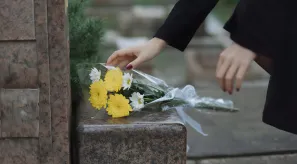In Spain, the price of a funeral can vary depending on different factors: the place (town, city, autonomous community, province, etc), the type of funeral chosen, the different services that are contracted, etc. Let’s calculate how much a funeral may cost in Spain.
What funeral expenses are included?
The cost of a funeral in Spain can vary quite a bit. Approximately, that amount can range between 3,500 and 6,500 euros if you do not have death insurance. However, if you add the numerous extras that are available this figure can reach anything up to 10,000 euros. An exact figure, however, cannot be given. What expenses influence the price of a funeral?
A basic funeral service includes expenses such as coffin, transfer, health and hygiene treatment and documentation processing required by law. To this is added the cost of the cemetery or cremation, the wake, the farewell ceremony, the flowers, the obituary etc.
Wake
When we decide to have a wake for our loved one, the rent of the room is an additional expense that has to be considered. The price will depend on many factors such as the size of the wake, the funeral company, the city in which it takes place, etc.
Coffin or urn
Whether you choose burial or cremation, you will have to pay the price of the coffin or the urn as is the case with cremation.
Usually, a coffin is more expensive than an urn. In fact, the coffin is the most expensive item among funeral expenses. There are many options to choose from and, depending on how luxurious it is, the price can reach as high as 1,300 euros.
This includes, of course, other related expenses, such as the transfer of the coffin by funeral car, the rental of a plot or niche in the cemetery, the preparation of the body for the wake etc.
If cremation is chosen, the cost of the urn and the rental of a columbarium or other grave for the burial of ashes should be taken into account if the ashes are to be deposited in a cemetery.
Burial or direct cremation
Generally, a burial is more expensive than direct cremation, since the latter dispenses with the costs of a wake, ceremony, flowers or music, so this is a key factor in the price of a funeral.
How much does a complete funeral cost? That will depend a lot on this choice. At a funeral it is necessary to pay for the coffin, the wake room, the cemetery and all the expenses attached to them (flowers, ceremony, live music...).
On the other hand, direct cremation saves on the cost of some of the funeral services, since it only consists of the cremation of the deceased person and the delivery of the ashes in an urn afterwards.
How can I save on funeral expenses?
Knowing how much a funeral costs in Spain, it is common for families to look for the most cost-effective options. How can I save on expenses? Here are some tips to save money on your loved one’s funeral:
- Purchase funeral insurance. This must be taken out before the death and it is a way for the family to have the service covered when their loved one dies. Usually, it is the deceased person who takes out this type of insurance during their lifetime. And it can be done directly with the funeral company. This advance planning will allow each person to have their last wishes fulfilled and to avoid having their loved ones pay for the funeral expenses when the time comes.
- Direct cremation instead of burial. We have already seen that the costs are considerably higher with a burial and that the direct cremation that we offer at Stelae is the cheapest option because there is no need for a funeral home, coffin or a large space in the cemetery to deposit the ashes afterwards.
When you do not have insurance, the second option is the one that helps you save more on expenses. Why?
- There is no wake so you do not have to pay the costs for using a wake room in a funeral home.
- The space in the cemetery is smaller and therefore cheaper. And you can also choose to spread the ashes elsewhere, which also saves costs.
- There are no fees for extra services such as funeral car transfer, flowers, catering, etc.
Consequently, to save on funeral costs in Spain the best option is a direct cremation, as well as the removal of services that are not basic and obligatory.



